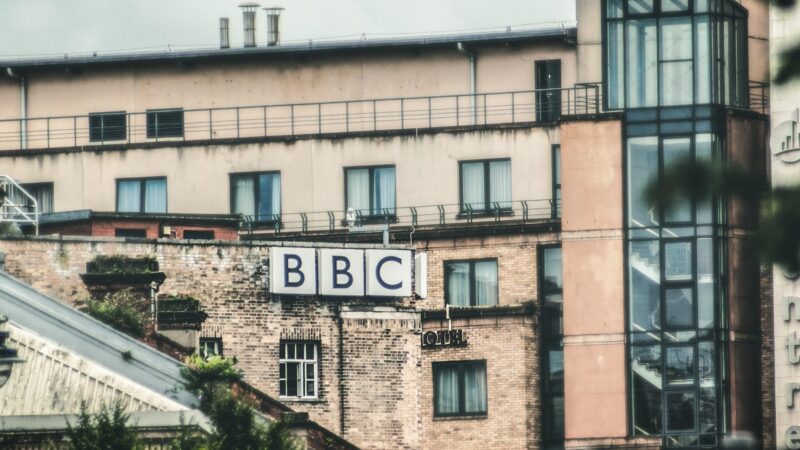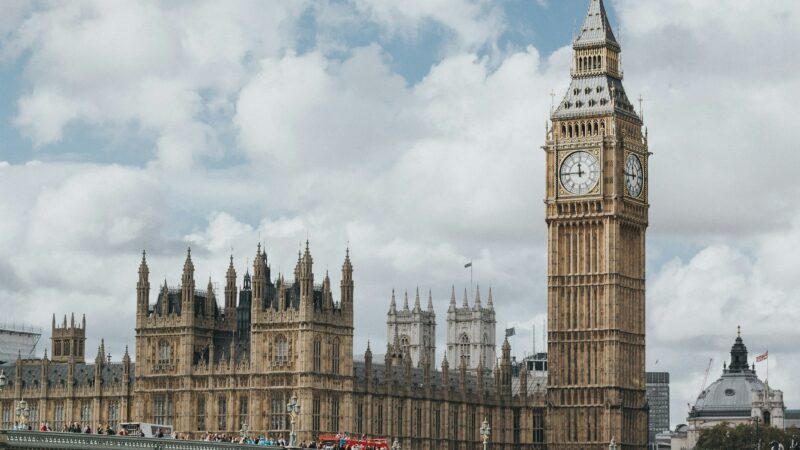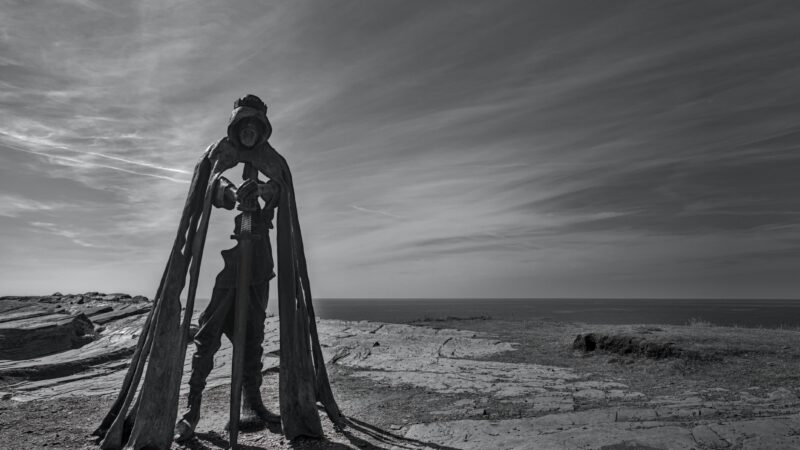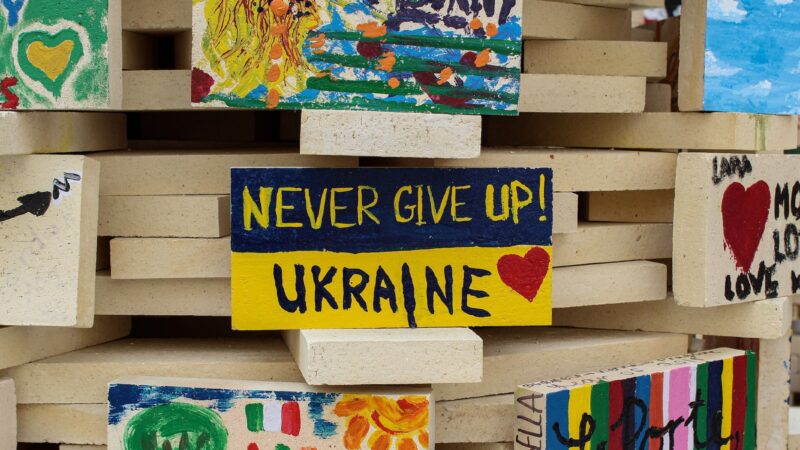Far-liberal Extremists and The Radicalisation of The Sensible Class
I tend to subscribe to the view that if you resort to personal insults then you have lost the argument, but every rule has its exceptions. When U.S. Congresswoman Marjorie Taylor Greene recently told Emily Maitlis to “fuck off”, I couldn’t help but feel some sympathy.
Maitlis, who spent many years at the BBC feigning traditional broadcast impartiality, has had no trouble morphing into her new role as a far-liberal talisman at The News Agents podcast (which has itself become something of a cult among the old gatekeepers of British media).
If I was being uncharitable, I would say that following the viral clip of Ms. Greene telling David Cameron to “kiss my ass” (after a Sky News reporter relayed the Foreign Secretary’s comparison of U.S. lawmakers to Hitler appeasers), Maitlis set out to get her own viral clip.
This wouldn’t be the first example of lazy journalism by The News Agents. The other week, they revealed an exclusive investigation into the GB News investor Sir Paul Marshall. The hard-working investigative journalists presumably worked day-in, day-out to present the public with these devastating findings. Sir Paul has a Twitter account and, as explained by arch-sensible Lewis Goodall amid a backdrop of otherworldly electronic music, has liked some tweets concerning mass migration to Europe. Shocking stuff, I know, but it gets worse.
Goodall presents some examples which he characterises as “quite extreme, especially on Isslaam, immigration and integration”. They include criticism of the Islamic call to prayer being recited inside a Parisian church and a clip of the Prime Minister of Hungary saying his country cannot be blackmailed into “putting children in the hands of LGBTQ activists”. The rest of the ‘investigation’ then finds other ‘extreme’ tweets, posted by some of the accounts which Marshall had ‘interacted’ with. It appears he is guilty of thought crime by association.
Against better judgement, I replied to the bombshell report saying I liked Mr Marshall more now. I did not expect this to provoke Mr. Goodall into asking me if I “approve of the political content of these tweets” and tagging my employer to ask if they were “comfortable with that”.
Maybe I’m a snowflake, but in my mind, that’s not intellectual sparring between journalists, but a measly attempt to instigate my firing from the company for which I work, also known as cancelling. I tried to respond, as Gavin McInnes often describes, by “talking to liberals in their own stupid language”, and stated I was the grandchild of Muslim immigrants (therefore, not ‘Islamophobic’) but I still thought we should be able to discuss our rapid demographic transformation. I was told that ‘no one is stopping’ me from discussing it and asked again to say whether I ‘agree’ with the content of the liked tweets.
As a reasonable person, I said I agree with some and disagree with others, and asked why he was tagging my employer into this conversation. Goodall then revealed his true colours, saying that as I agree with the migration-sceptic sentiments of some tweets liked by Paul Marshall, I should not “be working as a journalist for a reputable news organisation”, adding that the fact I “feel able to come and say that shows how normalised extremism has become”.
You see, we are allowed to say what we like and we have a free media, but if you dare agree with the sentiment of some people’s tweets that others do not agree with, then a public figure with considerable clout will alert your employer and call for your sacking as they accuse you of having extremist views. This censorious and frankly Soviet attitude of our sensible, friendly News Agent is sadly pervasive in our media and even has a strong grip over those working at organisations that explicitly position themselves as working to break this mould.
Many definitions of extremist are tautological, like the Oxford entry “a person who holds extreme views, especially one who resorts to or advocates extreme action.” Collins has gone with “a person who goes to extremes in political matters, a supporter of extreme doctrines.” Merriam-Webster’s entry for extremism is “the quality or state of being extreme, advocacy of extreme measures of views.” Great stuff, but the most interesting definition is given by Cambridge: “someone who has beliefs that most people think are unreasonable and unacceptable.” This is at least definitive. I don’t doubt this is the definition far-liberals subscribe to (consciously or not) but a problem lies within those key words: most people.
Following up their exclusive investigation into Paul Marshall’s Twitter likes, The News Agents have interviewed the other media mogul vying for The Telegraph, Jeff Zucker, who is leading the bid funded mostly by a high-ranking UAE royal and politician. Zucker declared to Jon Sopel, another sensible BBC-man, that The News Agents had “exposed finally that Paul Marshall is unfit to own a newspaper… that was clear from what your reporting last week exposed. We are clearly the best option for The Telegraph and The Spectator”.
Zucker’s decade-long stint as President of CNN saw that channel descend from a liberal-leaning and generally respected outlet to a collapsing parody of itself, irreparably damaged by thousands of hours of hysteria over the now disproven ‘Russia-gate’ allegations.
His reign also saw the network adopt a number of radical agendas including Covid-authoritarianism, accelerating uncontrolled immigration and carbon fanaticism. I’m not an expert on American social attitudes, but I’d expect ‘most people’ to find these beliefs ‘unreasonable and unacceptable’.
Most people wouldn’t agree with many Emirati customs either. Goodall’s view that engaging with critical views of mass migration to Europe from radically different cultures is racist extremism, would not be deemed reasonable by most people. The insistence of Maitlis that the many millions who have thrown their lot in with Trump are “conspiracy theorists” rather than concerned ordinary voters, would not be acceptable to most people.
I’m not trying to say ‘the other side are the real extremists’ (even though it’s an arguable case with this definition). I don’t find this word meaningful or useful – we already have words for those who advocate violence, and demonising people for not sharing an (alleged) majority view is not only unreasonable and unacceptable but the basis of all totalitarian societies.
In any case, watching The News Agents’ current tour of America is fascinating stuff. There’s a palpable sense they view themselves as political versions of Louis Theroux visiting rural Klan members or an Amish village. As a viewer though, the glaring perception gap between interviewers and interviewees cannot be missed. When Maitlis speaks to Congressman Byron Donalds, a black Trump-supporting Floridian, she asks him in incredulous tones whether he finds it “deeply offensive” when he hears Orange Man being racist and bad. Her questioning also includes some interesting remarks: “Donald Trump is trying to target the young black African-American: the masculinity vote”, asserts Maitlis. Her racial characterisations of the visibly bemused Congressman Donalds continue: “[Trump’s] lost a lot of women over the whole issue of abortion, so he’s going after young black men because they like his machismo”. The lack of self-awareness is truly astounding.
What happened to these people? As is often the case, they suffer from many of the afflictions that they ascribe to others. When the gammon awakening first took root at the advent of Brexit and Trump, we often heard about ‘the left-behind’, those people who, unable to deal with the changing world around them, had retreated to echo-chambers from which they sniped and lashed out. Look how the tables have turned!
In 2024, the far-liberals don’t even bother to hide their disdain for the masses with faux-empathy and anthropological labels. They don’t even engage with those they view as ideologically inferior anymore – they are simply to be mocked and then ignored. This is seen in the increasingly preferred format of propaganda, where mid-wit sensibles like James O’Brien angrily shout at and put down their listeners for being thick plebs.
What we are seeing is a radicalisation of those who view themselves as the sensible people in society. They are the dinner-party class and they have reacted to the deplorables breaking into the mainstream and creating thriving new media spaces by embracing their dismissive labels with a new vigour. While in the near-past there was some desire not to alienate the hoi polloi too much by calling them all whatever-ist or something-phobic, now the far-liberals don’t even try to restrain the scope of what they consider to be radical and extremist (as the inclusion of The Conservative Party, GB News, Reform UK, The Telegraph and even this esteemed publication in Hope Not Hate’s recent ‘State of Hate’ report shows).
As such, ‘conspiracy theorists’ and ‘extremists’ (and privately, ‘nutters’ and ‘cranks’) have become magic words for far-liberals to signal their virtue to each other, and to shut down anyone else who they deem politically incorrect. ‘The public are idiots’ and ‘voters are incredibly stupid’ are sentiments heard all too regularly from journalists off-camera. This fully closed mind has given up on intellectual curiosity and severed its connection with facts.
The conspiracies that they deride are often based on genuine intersections of vested interests and power structures, yet they have started to engage in their own conspiracy theories, alleging with little evidence that Boris Johnson is a FSB spy, that Russian interference decided Brexit and that dark shadowy forces are behind groups against lockdown and the endless restrictions on motoring. In their world, conspiracies are not engaged in by the elites against the people, but by the people against the elites – how about that!
These arguments can easily evolve into semantics so allow me to bring us back down to earth for a second – let’s picture in our head a hypothetical ‘normal, ordinary person’, and put to them a few differing positions and imagine what they’d say is the ‘extreme’ position:
- Increasing our population by many millions with spiralling numbers coming from the poorest and most backward parts of the world VS taking in a very small and manageable number who have genuine ties and come from compatible countries.
- Allowing endless thousands of unknown fighting-age illegal migrants from warzones to be escorted on dinghies into our country and to be put up indefinitely in hotels at the taxpayers’ expense VS using our armed forces to protect our borders from illegals.
- Encouraging and subsidising children to mutilate their genitals and take copious amounts of hormones and hard chemicals as part of a legally recognised ‘identity’ and proposing outlawing therapists from talking children out of that VS recognising transgenderism for what it is: a mental illness, often mixed up with autogynephilia and fetishes, made into an identity and promoted by the state.
- Sending billions of our taxes to military contractors via corrupt Ukrainian politicians so that a brutal war of attrition, that could have been ended a month after it started, continues to rage on even at the risk of nuclear armageddon VS telling Kiev that it has to become an explicitly neutral state and normalise relations with Russia so Europe can develop a new and lasting security architecture.
- Systematically discriminating against white people on a political, corporate and cultural level to rectify the microscopic racism that other people face while ignoring heinous crimes like rape-gangs and stabbing epidemics in order to not be racist VS judging people by the content of their character and not by the colour of their skin.
I’ll let you decide which set of views you think Joe Bloggs would find most extreme, but to my mind, there’s no question that the positions of the far-liberals represent the real extremism plaguing our country. They have no sense of proportion or measurement. Despite the negative effects of their Swiss-cheese worldview being all around, ideological sunglasses convince them that they are not only correct but are morally superior. This is insane.
Batya Ungar-Sargon, an American left-wing journalist and big news star has been disowned by elite Democrats for pointing out that the party has lost the working class to the MAGA movement. She recently gave an interesting analysis on Steve Bannon’s War Room podcast:
“Working class Americans, whether they vote for Democrats or Republicans, whether they are ‘liberal’ or ‘conservative’, they all have the same views. Neither party is really speaking to them, they all agree by and large about the most important issues – polarisation is a totally elite phenomenon.”
We see this here in Britain too. The major parties attack each other in the media while rabble-rousing in Parliament over their cosmetic differences but they agree with each other on all the major issues of the day, and the public by-and-large disagrees with them.
There is nothing sensible or tempered about the policies enacted, both at home and abroad, over the past few decades. There is nothing democratic about the messages sent by voters being disregarded and ignored time and time again. When they try to gaslight you into thinking they are on your side, like Sunak’s recently discovered concern about Islamist extremism, do not forget that it is he who is presiding over the current record levels of both legal and illegal migration, and his party that has enforced failing multiculturalism and indirectly supported radical Islamic terror in the Middle East. All the toys will come out of the box for our Punch and Judy elections, but be in no doubt: all the far-liberal elites are equally responsible for our woes and operate as a uniparty (which neither you nor I am in).
Commentator and author Mark Dice advocates using liberal jargon in reverse, coining phrases like ‘anti-whiteism’ and ‘black fragility’. I think we need to start giving back what we get and incessantly label these dogmatists as far-liberal extremists. Instead of being on the back foot, constantly defending ourselves against smears and allegations, it’s high time to tell these lunatics that we, ordinary normal people, are the real sensibles of this country and that those destroying society with dangerous ideologies are those better described as extremist.
Yet if they still laugh gormlessly in your face, you could always just tell them to “fuck off”.






Why We Shouldn’t Abandon Politics
Until a few weeks ago, I was thoroughly resigned to the fact that I would not be voting for the first time in my adult life.
This wasn’t a flippant or particularly natural decision for me. A fan of unfashionable causes from a young age, I had always bought into our democratic political system and believed that despite its faults, ours was preferable to the large majority of those around the world.
I’d argue with my sixth form college history teacher, a chain-smoking trade union crustacean, that the Cuban revolution was not a good thing actually. At university, I set up the local youth chapter of UKIP and was one of approximately three students who even signalled that they would vote for Brexit.
As one can imagine, this made me very popular amongst the kombucha-brewing techno-listening charity shop fashionistas who I stubbornly brushed shoulders with by insisting on frequenting their hipster coffee shop, where once a ‘trans’ person told me I should “stop reading the fascist Spectator”.
My earliest political instinct, that our foreign policy did not serve our interests and was based on lies (an instinct that has only grown stronger) was also, I thought, sufficiently represented in our media and political system. I voted, I got excited about elections, watched the BBC and took politics seriously.
Everything changed in early 2020. Watching the entire ‘free world’ engage in highly coordinated state propaganda, erect detainment camps, lock people in their homes for months at a time, and by hook and by crook inject the vast majority of the population with a substance they weren’t allowed to scrutinise in polite society because ‘The Experts’ told them to, changed how I look at politics forever.
I was always aware of the military-industrial complex and its influence, and of that of the financial system. What I have since learnt is that these forces of evil are joined by many other interest groups: Big Pharma, Big Tech, Big Food and the billionaire-foundation complex.
The mask-wearing millions even turned my anger towards them, the public as a whole, which was a very different feeling for a ‘power-to-the-people’, ‘silent-majority’ populist as I had up until then been. What morons, I thought.
How did I ever trust in the collective wisdom, the ‘common sense’ of the public, who had en masse accepted the (even then) clearly moronic behaviour of ‘stay-at-home’ rules and wearing chemical-laden Chinese face-nappies on while alone and outside?
When the Russians entered Ukraine in early 2022, this feeling was compounded. The Covid era had caught everyone off guard, but Ukraine was something I had seen coming for a decade.
In 2014, the year when the Russia-Ukraine war actually started, I had just started university studying, of all things, International Relations and Russian language. I had a large number of Russian and Ukrainian friends. I spent my summers volunteering at educational camps not far from the Ukrainian border. After graduating, I moved to Moscow and started working in TV.
This is my way of saying that I had followed the events since 2014 in detail, with interest, and understood the positions of both sides, the actors involved and like Nigel Farage, had a very strong feeling that this was a disaster in the making. Yet this was a position made paramount to treason. Putin was Hitler, and that was it.
Back living in London and working in UK media after riding out the worst of the pandemic in Istanbul, I had become fully cynical about politics.
How could our parochial, insular and frivolous party politics ever be a solution to the powerful global forces that had transformed the world within just a couple of years? How had I believed that the political fight I had been fighting actually had any chance of taking Britain away from corrupt globalist forces and ‘taking back control’ for the people? Brexit now appeared to be window dressing.
In fact, I had come to believe that I had been seriously deceived. Years of energy were given, and the country was seriously divided, and for what? To have more mass immigration and more economic decline under more Conservative government, with biomedical tyranny and continental war to boot?
In that time, I began to believe in the devil, which was then a stepping stone to believing in God. The world, it appeared, was the devil’s realm. The compounding increase in far-liberal and ultra-progressive ideologies, and the resulting destruction of the family and social degradation, made this clearer.
I concluded that the best way to fight in a world run by the devil, was not through politics, but through free will and faith, walking towards God through this darkness. I still hold that to be absolutely true.
Yet something has happened over literally a matter of weeks that has reignited my interest in politics, and it is more than the return of Nigel Farage, although that has been the catalyst.
The prospect of total Tory collapse was first enticing only out of pure spite.
I had been critical of Farage, one of my political heroes, for what I viewed as terrible positions taken by him and his party during the Covid era, and a perceived silence on our disastrous foreign policy, after years of being outspoken and having the right idea.
Though my disappointment in and disillusionment with politics did indeed make me cynical, nothing made me more cynical than working in British media.
After working with interesting, heterodox international and expat journalists abroad, I discovered that back home it’s staffed largely by mediocrities, as fickle and, frankly, basic as any KMPG graduate or marketing intern.
Outside of the narcissism of small differences, wholly adopted from newspaper op-eds and ‘journo Twitter’ in cyclical bouts of opinion bottom-feeding, they are often not the well-read intelligentsia that they present themselves to be.
Yet the depiction given by many in sceptic quarters, that narratives are tightly controlled by explicit political directives handed out from above, a view I have been sympathetic to in the recent past, does not seem to hold water.
Don’t get me wrong, the fact that there are a small handful of news wires which provide thousands of newspapers and news channels with the same stories, they decide to put out in the way they want, is far from ideal and does have the ability to influence the news cycle.
Yet on the day-to-day, factory-floor level, the reality is that the media, and politics, is largely made up of people who are subject to the very same waves of information warfare, perception manipulation and social acceptability that the general public and all of us are to an extent.
If it is indeed the case, as I now believe, that the enemy is not only far weaker than it has led us to believe, but has never been weaker than it is now, we do not only have the possibility the shift the Overton window through politics, which the media have no way of hiding from, but that we have a duty to be happy warriors and believe that it is possible to effect change.
For those still rightly enraged about the collective amnesia over Covid era mandates and who therefore see Reform as invalidated by not choosing to campaign on that, the reality is that its leadership now hold the correct view of the lockdowns and the jabs, even with the benefit of hindsight.
This won’t satisfy everyone, and I am completely sympathetic to that, but as Bismarck famously said, politics is the art of the possible, and what is possible at the moment is to mobilise around our current problems. Immigration is the obvious issue that will galvanise serious support against the uniparty – and our demographics are our ultimate destiny.
The rise of Reform to neck-and-neck polling position with the Tories is indeed an impressive feat. In fact, the campaign of the Conservatives in this election, which suspiciously feels like it is being directly run by the Labour Party for their own benefit, has got many wondering if this is not an orchestrated handing over of the baton.
In late March, Barack Obama, the man rumoured to be de facto running the Biden administration and campaign, dropped in to see Prime Minister Sunak, for reasons undisclosed.
In the following weeks there was talk by Andrew Bridgen MP that Sunak had been ‘told by the generals’ that we would officially declare we were at war against Russia in the summer ahead of a major escalation. The PM, it is alleged, responded that he did not want to be a wartime leader and a couple of weeks later had abruptly called an election.
All of this, alongside Rishi’s announcement in the rain, which bloggers have called a ‘humiliation ritual’, has led some theorists to believe the Tories are basically throwing the election. Reform, so the theory goes, is ‘controlled opposition’ designed to contain the Tory exodus.
There might be elements of truth to what I have just outlined but my personal experiences with Reform’s leaders do not lead me to that final conclusion. Farage and his team are genuinely running an anti-establishment revolt.
Not only is he running on the same issues which have only gotten worse since Brexit, our broken economy and the rapid demographic transformation of the country, but there is plenty of red-meat for sceptics; railing against the Tories for ‘taking away our freedoms’, hitting out against the World Health Organisation and the World Economic Forum, fighting against debanking, a cashless society and Net Zero lunacy. It’s not a bad platform.
The Andrew Breitbart doctrine is that ‘politics is downstream from culture’. It might then seem obvious that culture is therefore downstream from media, but as I have outlined, that is in fact not the case.
Our media is downstream from both politics and culture. Farage is very successfully using will to power to shift the Overton window and provoke the media into discussions they would ordinarily not have.
Whether you trust him to stick to these positions when push comes to shove almost doesn’t matter as much as his proven ability to act as a battering ram against our established political elite. In any case, he has been consistent on everything and on the Covid saga he has now come to the right place, which is more than can be said for others.
It has been Farage’s positioning on Ukraine, however, that has clinched it for me.
Despite the potential to alienate much of Tory Boomer-England who display their Ukraine flags with the same zeal that Corbynista students do with their trans-Palestinian-EU ones, Farage has stuck to his long-held position that this horrendous conflict was a long time coming.
The establishment, smelling blood, sought to use this to neutralise him, but he hit back harder and spent days making speeches outlining the failed wars of the uniparty, the lies they were based on and their horrific consequences. Labour in Iraq, the Tories in Libya and Syria and yes, Ukraine. “Foreign policy matters!” he’s been telling energetic crowds.
The power of taboos is a force more potent and yet more vulnerable than we imagine. A few hundred thousand of us silently crossing boxes in polling booths do have the power to change the parameters of acceptable discussion by the fallout it can cause for years to come. We should not scoff at that.
At a time like this, when all signs are that the most dangerous and corrupt elements of the collective West are itching for a global conflict, the man who proudly bellows to large crowds that “We only go to war as a very, very last extreme; I will campaign for peace wherever it is possible”, has my vote.
As it says in Psalm 146, Trust in God, Creator and Redeemer:
I won’t, but I will not abandon politics as a way of shifting the dial to expand public consciousness and as a way to take us off potential paths of ruin. Not yet.
Photo Credit.